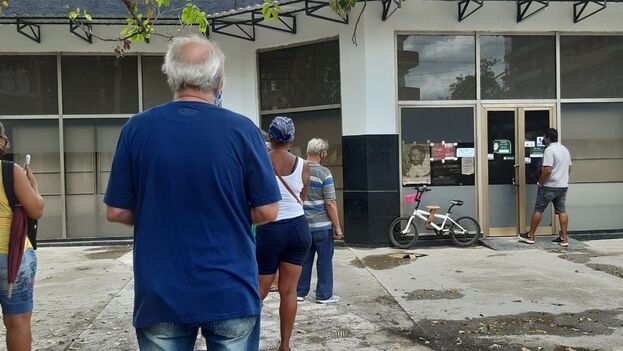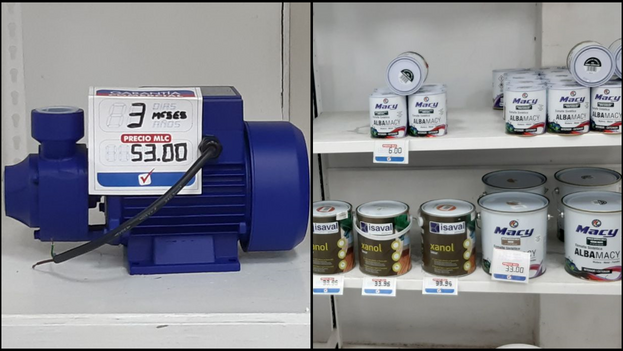
![]() 14ymedio, Natalia López Moya, Havana, 21 May 2021 — One day, they close due to a supposed renovation or the need to take inventory, and weeks later they open in another currency. That is the story of many neighborhood stores that have gone from selling in Cuban pesos to offering their products in freely convertible currency (MLC), a dollarization that spreads throughout Cuba.
14ymedio, Natalia López Moya, Havana, 21 May 2021 — One day, they close due to a supposed renovation or the need to take inventory, and weeks later they open in another currency. That is the story of many neighborhood stores that have gone from selling in Cuban pesos to offering their products in freely convertible currency (MLC), a dollarization that spreads throughout Cuba.
The list of these state businesses grows every day. This transformation causes discomfort among the population, who perceive the change with a feeling of economic instability and monetary discrimination, but the process seems unstoppable for the authorities, thirsty to collect foreign currency at any cost.
The El Bimbón ice cream parlor, located at the intersection of Infanta and Manglar streets, in Havana, is an example of this reconversion. Until recently, the place had an attached store that sold basic necessities in pesos, but today, to be able to acquire its poor catalog of merchandise, payment must be made in dollars.
This transformation causes discomfort among the population, who perceive the change with a feeling of economic instability and monetary discrimination, but the process seems unstoppable for the authorities
“I’m the last in line, but I warn you that this store is in dollars now,” a woman in her 70s clarified this Thursday to a customer who approached the line. Inside the premises, the offer was very limited: tomato sauce, pasta, chopped meat and frozen chicken. A few months ago, more or less the same merchandise was sold in pesos.
Faced with the avalanche of complaints about the social differences that deepen these markets, the Minister of Economy, Alejandro Gil, tried to calm things down last December and assured that the opening of foreign currency stores for the sale of food and hygiene products was “a social justice and socialism decision”.
“An undersupplied market does not attract foreign currency,” the Minister explained then, referring to what many Cubans have classified as “monetary apartheid” that divides society between those who have dollars to buy products in these shops and those who must comply with the network of stores in national currency.
A few weeks ago, the El Bimbón store was closed, allegedly because several workers tested positive for the coronavirus. Days of rumors concluded with the store reopening, but this time with somewhat more assorted shelves and merchandise exclusively for sale in MLC.

“Now, to buy chicken or chopped meat, I have to walk at least 12 blocks and, on top of that, stand in an endless line, and I’m no longer feeling healthy enough to be doing this,” another customer complained this week. The store is a few meters from a multi-family building known in the neighborhood as “Fame and Applause” because it is home to artists and television presenters.
“All those people who appear in the official media live right here and have not said a word about this injustice,” laments Mateo, a 67-year-old retiree who lives on nearby Amenidad Street. “Since this store switched to foreign currency, the whole neighborhood is hanging on by its fingernails, but these people don’t say anything, they continue parade their faces in the news in order to support and applaud the Government”.
In mid-October, the State-run daily Granma published that the country “will not dollarize its economy” and that the stores in MLC “are necessary, but temporary”. In the article, the official organ of the Communist Party quoted Minister Gil, who assured that the monetary system “is thinking” for Cuba “to work with a single currency: the Cuban peso.”
Raúl Castro himself, in his report to the Eighth Congress of the Communist Party, acknowledged that “the stores in MLC were created to encourage remittances from abroad”. However, it does not seem that their end is near, to the contrary.
A few blocks from Infanta and Manglar Streets, on the corner of Santa Marta, another market has been closed for months. A rumor has reached the residents of the place that, when it reopens, its sales will be in dollars. “There’s a store 20 meters from the entrance to my house, but I still have to travel one kilometer to buy a piece of chicken, it is not easy,” says a neighbor.
Something similar happens in the Panamericana Aranguren store, in El Cerro, the epicenter of lines and hubbub: it has been closed for more than a week, supposedly due to an outbreak of the virus among its workers. Neighbors fear that it will reopen with an assorted stock, but in the new mode of sale in foreign currencies.

“I asked the delegate of the Popular Power and she told me that this issue had not been discussed at last Monday’s meeting, but that, even they did not have that information because those things came from higher up,” complains a neighbor. “Sometimes I think of Cuba as a very tall building and that our leaders live in the clouds.”
“There isn’t one hardware store left that does not sell in dollars in this country. The one on Infanta and Desagüe streets previously had a varied array in convertible pesos, but now, even to buy a valve, an elbow joint or a screw you have to go with the blessed little MLC card”, comments the worker of a private cafeteria across from the store La Especial.
“Today they put up water pressurizers for sale at La Cubana (previously called Feíto y Cabezón) and no one can even enter the store: they allow 50 people a day in to buy and on top, there’s a limit of one pump per card,” warned a frustrated buyer at full volume who ended up returning on foot through Reina Street when he saw the long line in front of one of the most important hardware stores in the capital.
Not a year has passed since their opening, and the stores that sell food and hygiene products in foreign currency are already going through a crisis
Not only do long lines and the inability to pay in national currency mark these stores. Not a year has passed since their opening, and the stores that sell food and cleaning products in foreign currency are already going through a crisis. Supply shortages and very long lines mark the days in the most criticized shops in the country, the only ones, however, that still have more than a dozen products on their shelves.
Given their elitist nature, the markets in MLC provide a new modus vivendi to thousands of Cubans who have magnetic cards in foreign currency. They buy grains, meat and dairy products, hardware, furniture and preserves that they then resell in the informal market. Eager customers pay to not wait in long lines, to avoid COVID-19 contagion.
“Lines after lines are in dollars, but with service as if they were in Cuban pesos”, a man lamented this Thursday upon exiting a market in MLC on Galiano Street. “No matter what currency you pay with, the disaster is the same.” In the lines, under the sun, some customers nodded, while others preferred to look away.
____________
COLLABORATE WITH OUR WORK: The 14ymedio team is committed to practicing serious journalism that reflects Cuba’s reality in all its depth. Thank you for joining us on this long journey. We invite you to continue supporting us by becoming a member of 14ymedio now. Together we can continue transforming journalism in Cuba.
